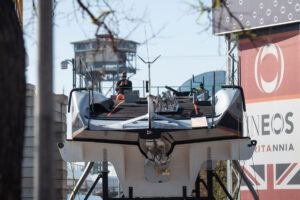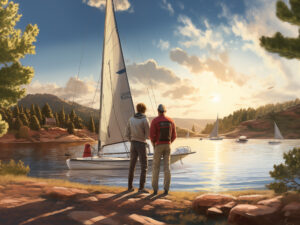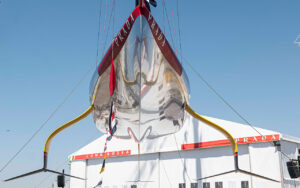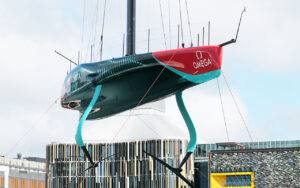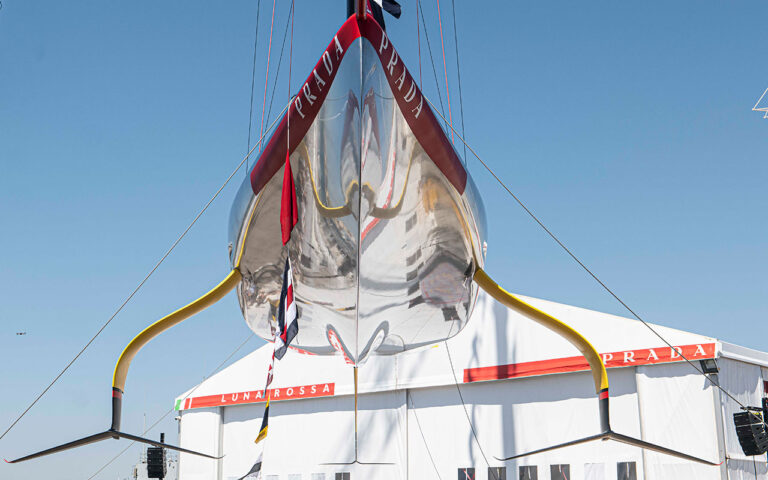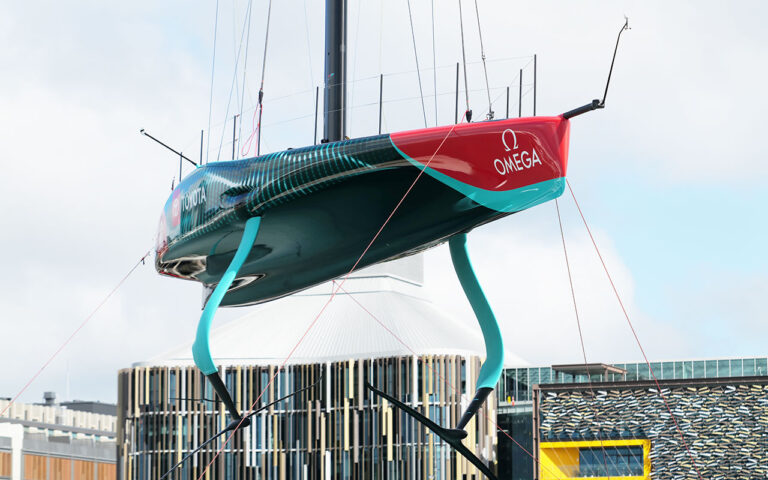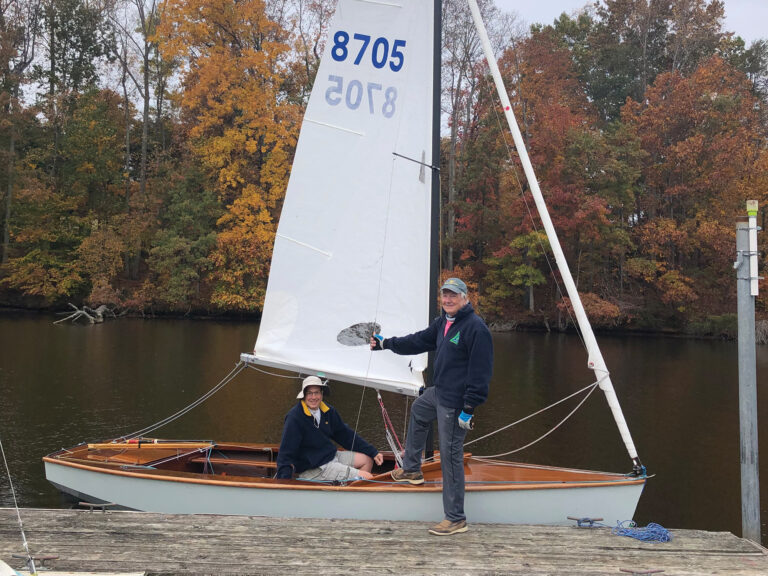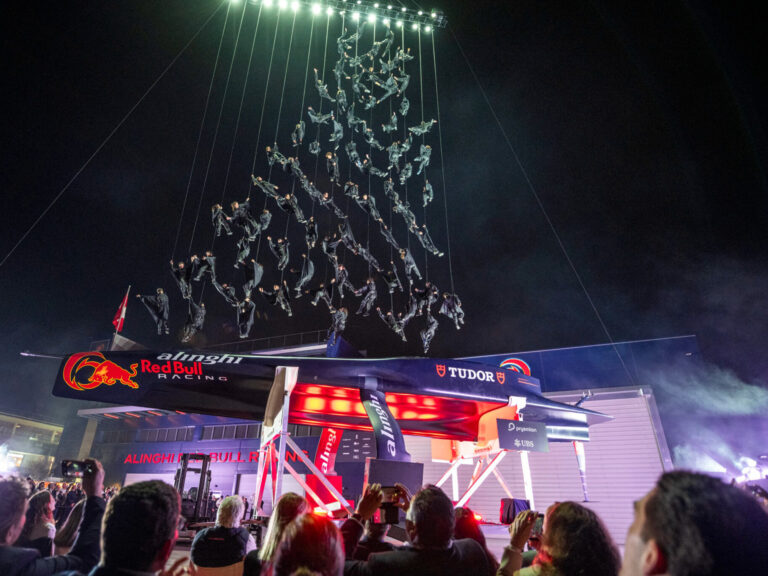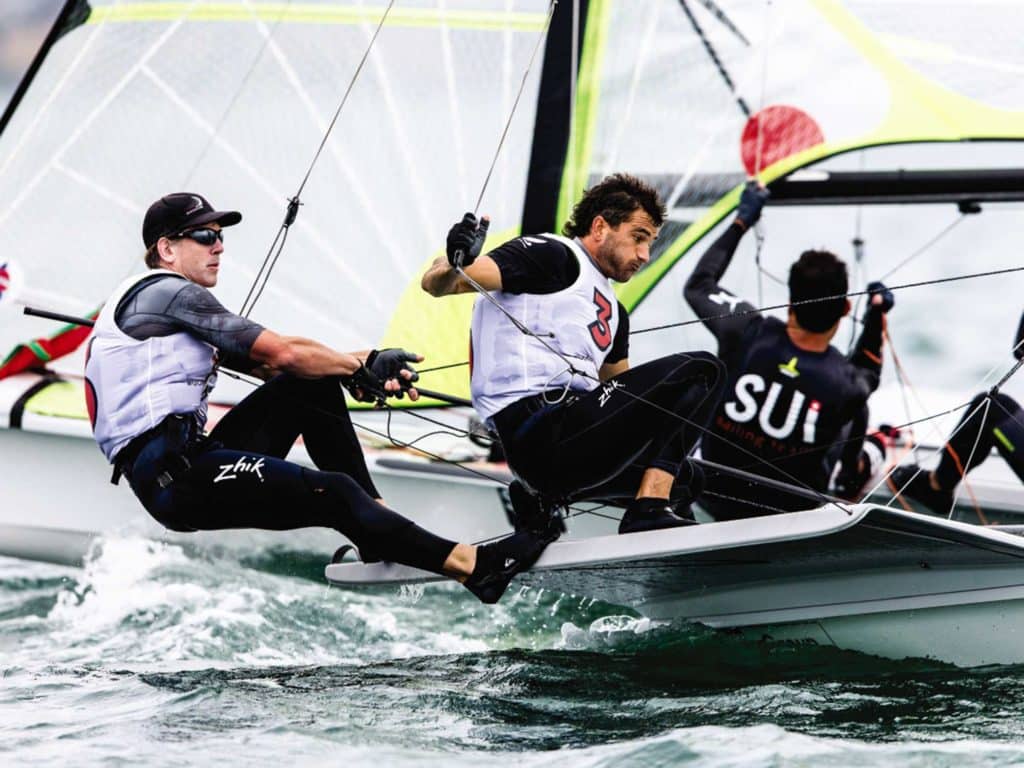
It’s Pete and Blair. Journalists say Burling and Tuke, respectively, but because they are so intricately attached to each other, it’s appropriate to associate the two as practically twins. Every boat on which they sail together, they move in synchronization. Even the most trained eye finds it impossible to find flaws. At the 2020 49er World Championship in February in Geelong, Australia, the pair won an unprecedented sixth world title in the class. No one in the crowd even blinked.
Their emotions, despite having also won the 2019 world championship three months before in their native New Zealand turf, were surprisingly high as they pulled their skiff up the seaweed-covered ramp in a cool drizzle after the medal race. It never gets old for these two.
“I’m pretty stoked to win this one, and obviously being an Olympic year, we wanted to test our skills,” Burling said, with a big grin and a rare chuckle. “I’m pretty on top of the world to walk away with another one.”
The pair could not have imagined that the travel bans from China that week, hints of a burgeoning pandemic, would become a global shutdown, leading to the cancellation of the 2020 Olympics. The sailing in Enoshima would have most certainly been a reenactment of their gold-medal performance in Rio de Janeiro. As the primary characters on Emirates Team New Zealand’s America’s Cup defense team, their 2020 Cup also came to a grinding halt. But no virus would stop this duo.
Considered the best male sailors on the planet, having won the America’s Cup together in Bermuda, having sailed around the world in the Volvo Ocean Race and won a gold and silver medal, deconstructing their dominance in the sport is an impossible task, vexing even the top coaches in the world. To better understand how Pete and Blair do it, you have to read between the lines. And listen carefully to the people who watch them closest.
“They’re not leaps and bounds ahead, but they’re always there, always. Every single time, they’re always there in the last race,” says four-time 49er world champion Chris Nicholson, of Australia. “So, on the law of averages, it kind of means they’re almost leaps and bounds ahead,” he concludes, with a wry smile.
Nicholson emphasizes the “always” with a certain seriousness, a lowered stare, almost as a warning to anyone trying to compete against the pair.
The clinical ability these two sailors possess allows them to execute tactical maneuvers and decisions that, at best, other teams see as possibilities but don’t have the confidence to try. Nicholson knows, just a little, where this rabid consistency in execution comes from.
He remembers training with Burling and Tuke, now 31 and 30, respectively, before the 49er World Championship on Italy’s Lake Garda 10 years ago, “when they hadn’t made it yet, but it was clear that they would.”
“They’re just smart,” Nicholson says. “They were working on all kinds of areas of their sailing that were three months, six months in advance of where they were.”
There’s an efficiency and confidence that shows, integrating kernels of skills not yet established in the building blocks of elite athletes, allowing the transitions up the ladder of progression to occur more smoothly and sooner. But it takes brilliant minds and coordinated physiology to even consider or think of this approach. Nicholson noticed these unique qualities immediately, and in the small nation of New Zealand, it didn’t take long for these two to find each other and start building what has become an unbeatable partnership.
From a modest home in the New Zealand town of Kerikeri, Tuke says he was fortunate to be close to the water. He started racing at the age of 12, eventually crewing on one of the top team-racing school teams. Crewing on International 420s, 29ers and eventually with Olympic medalist Bruce Kendall in the Tornado, Tuke and Burling met on the 420 circuit. After Burling’s first Games in 2008, at the age of 17 in the 470, he looked to Tuke when he shifted to the 49er.
“I wouldn’t say we were close at that stage,” Tuke says of their relationship. “After three months of sailing the 49er, we got along and made a goal of doing London 2012. It was a steep learning curve the whole way up to London,” he recalls. “We went from new to—three and a half years later—winning a silver medal. When you start, it’s about boathandling. Now it’s about speed.”
Burling grew up in the beachy town of Tauranga. His path was a little more structured in dinghies, racing in indigenous craft such as the P Class and Starling. “The P Class wasn’t overly balanced,” he says, “but the Starling was a lot more balanced; it flowed nicely. It was a great boat to learn from.”
At 5 feet 11 inches, just a haircut shorter than Burling, Tuke is relaxed and congenial. His dark hair and square jaw make him a bit intimidating, but his looseness and quick smile offer a counter to Burling’s directness.
The two started their first campaign during a medal drought for New Zealand’s Olympic sailing program. “In the early days, we didn’t have people to race against, so we spent a lot of time on boathandling,” Tuke says. “You know the outcome you want out of a maneuver. If they don’t, you got them.”
At the 2020 Worlds, it seemed both the 49er and 49erFX sailors had put serious time into studying the Kiwis, dissecting their superior skillsets.
“The hard thing with Burling is nobody really knows why he’s fast,” says Keanu Prettner, a young Austrian 49er helm. “His style? It’s really smooth. They don’t communicate a lot. They just know what to do.”
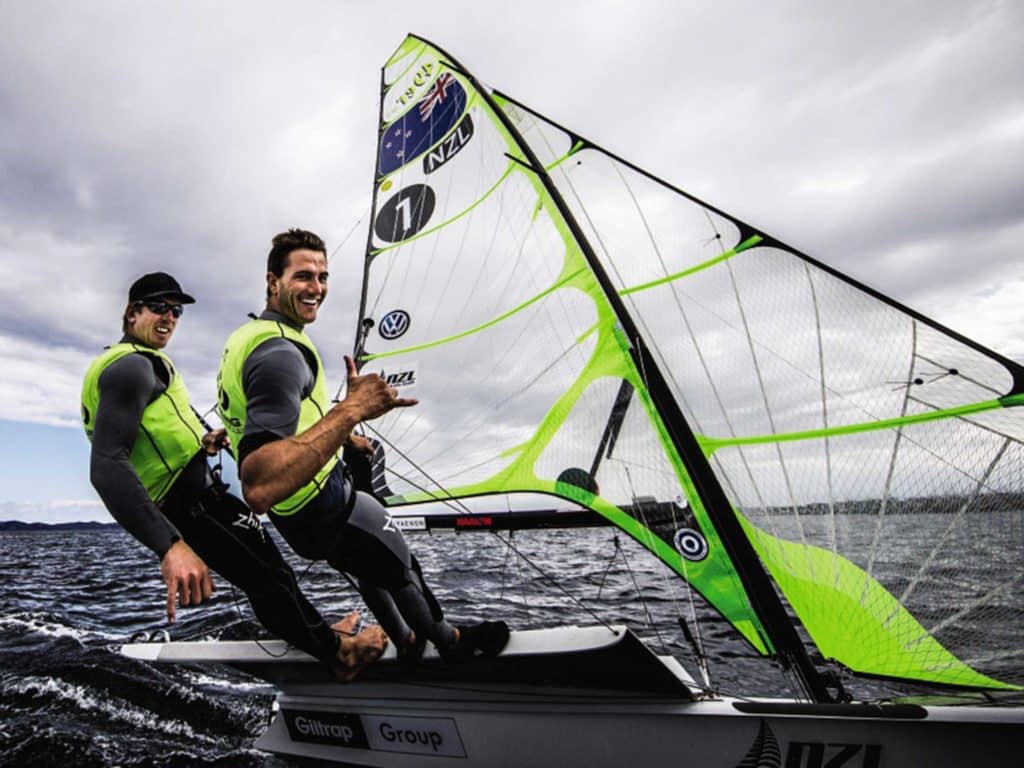
There is a head-shaking frustration in Prettner’s response, as if he is looking for a silver bullet, something to write down, to emulate, to learn.
“It’s about experience,” adds Jakub Flachberger, Prettner’s crew. “The coaches see it best. They would have figured it out if there was something big to see.”
Burling also points to boathandling as their strength, and some observers say it’s impossible to match it at this point. The 10,000 hours it takes to be an expert at anything doesn’t assure anyone of dominance, just some form of mastery. And it can’t just be boathandling.
Before Burling and Tuke, there was Nathan Outteridge and Ian Jensen, 49er gold medalists in 2012 to the Kiwi’s silver. The Aussie pair’s early successes in the 49er and foiling Moth classes, combined with the America’s Cup moving to catamarans in 2012, helped create a demand for young high-performance sailors from the 49er ranks comfortable in fast boats and with rapid-fire decision-making skills. Understanding the 49er helps not only identify how the boat helps create the sailor, but what attributes the team has that breeds success.
“It’s the shared nature of responsibility between boat and crew,” says Ben Rhodes, British 49er Olympian and world champion, on why the class produces such talented sailors. “I never felt like I was crewing. There’s something about the hands-on-ness. It’s not speed on the water; it’s speed in decision-making around the course. That’s why a good 49er sailor can go anywhere.”
The Kiwi pair’s sixth world title puts them on a unique plane that competitors can simply dream of. Stevie Morrison, Rhodes’ helm, separates the 49er class into historic segments, naming the previous time period the “Outteridge years.”
“They have the perfect personality combination,” says sailing journalist Nic Douglas, of Australia, who’s followed their careers closely. “Pete is almost robotic, tactical. He is so clinical, and it seems he puts his emotions aside. Blair is emotional and talented. If [Pete] is risk-averse, Blair will say, ‘Let’s do this!’”
The Superclass
“With every generation, there’s something better than anything else,” says Dave Ullman, multiple world champion and coach of US 49erFX sailors Stephanie Roble and Maggie Shea, who qualified for the rescheduled Tokyo Games at the 2020 Worlds. “Both went around the world. That really showed us something. It shows they’re really, really good. Not anyone can do it.”
Ullman’s assessment of Burling and Tuke is not to be understated. Gold in 2016, America’s Cup win in 2017, around the world in 2018, with a few world championships in between. It would seem those three years of diverse sailing would have made it hard for them to jump back into the 49er at a peak level, but this diversity has only made them stronger. And happier.
“We enjoy what we do and enjoy the diversity,” Burling says. “If I just did 49ers for 12 years, I’d be a little bit over it. It’s only one-third of my life. I enjoy the challenge of figuring out a smarter and better way of doing things.”
The Volvo Ocean Race was a particularly awesome experience for Burling. His posture changes when he talks about ocean racing: He leans in, like it’s what he really wants to talk about. “To test my skills offshore was pretty special,” he says. “I learned a massive amount about myself.”
The 24/7 style of racing and those physical and mental demands were a fascinating challenge. “The most interesting thing for me was how to deal with sleep deprivation and knowing when to push or not,” Burling says. “In 49er, if you can’t push 100 percent of the time, you’ve made a mistake. In the Volvo, you have to know when to rely on other people or ask for help. You have to know the fatigue factor.”
Tuke had a head start on his partner. Having aspired to do the Volvo Ocean Race since childhood, he sailed to Fiji with his father when he was just 13. “We fished all the way up,” he says. “I loved it.”
A Sydney Hobart Race rounded out Tuke’s experience before sailing the Volvo with Team Mapfre in 2017. “It was a massive life experience,” he says. “You learn how to get the best out of people in a way you don’t get in any other sport. Not in such a high-pressure situation.”
Burling and Tuke no longer train more in the 49er than any other team, but they are still sailing nearly 300 days each year, and always under pressure. They have opportunities their Olympic rivals could only dream of, and as New Zealand began to clear the hurdles of the COVID-19 pandemic in May, Burling and Tuke were back on the water, training in Emirates Team New Zealand’s diminutive foiling test boat. Without an Olympics between them and the 2021 Cup races next spring, they are now singularly focused. But that balance and diversity, which they say they need to stay fresh, is always on their mind. “After the Cup, I’d love to do another Ocean Race and do it for New Zealand,” Burling says. “It’s a tough race for New Zealand, and it always feels weird when you race for another nation.”
He also thinks about the change in Olympic classes, and when asked about the mixed offshore event, he was critical. “The thing that frustrates me is it’s so hard for young kids to see a pathway through,” he says. “When I was young, the classes were stable. You knew the equipment could hold value. Our sport is expensive. That’s why the Laser, 470 and 49er are so strong.”
Burling does see the mixed offshore event as an interesting, if not appealing, challenge. “Part of the fun of these campaigns is building up the pieces of the puzzle together, at the right time,” he says.
He and Tuke not only spend hundreds of days training together each year, their downtime is often together, but not by design. “It’s funny, we share so many of the same hobbies,” Burling says. “To relax? I spend time out on the ocean: freediving, spearfishing, surface-fishing, foil-surfing.”
Though Burling says he has the most respect for Outteridge as a sailor, it’s waterman Kai Lenny who inspires him most. “It’s incredible how progressive he’s been with a wide variety in all aspects of watersports,” Burling says.
At the closing ceremonies in Geelong, a wet, tired group of 49er, 49erFX and Nacra 17 sailors pack into the tiny sailing club’s bar area as downpours drench the dinghy park. Burling leans against the edge of the bar, smiling as the awards are handed out. The occasional friend pats his shoulder as they walk by, and even though many of the sailors present are heartbroken about not qualifying for the Games, the room erupts when Burling and Tuke take to the stage. Once again, they have everyone’s attention. There is no better pair in all of performance sailing. ν

